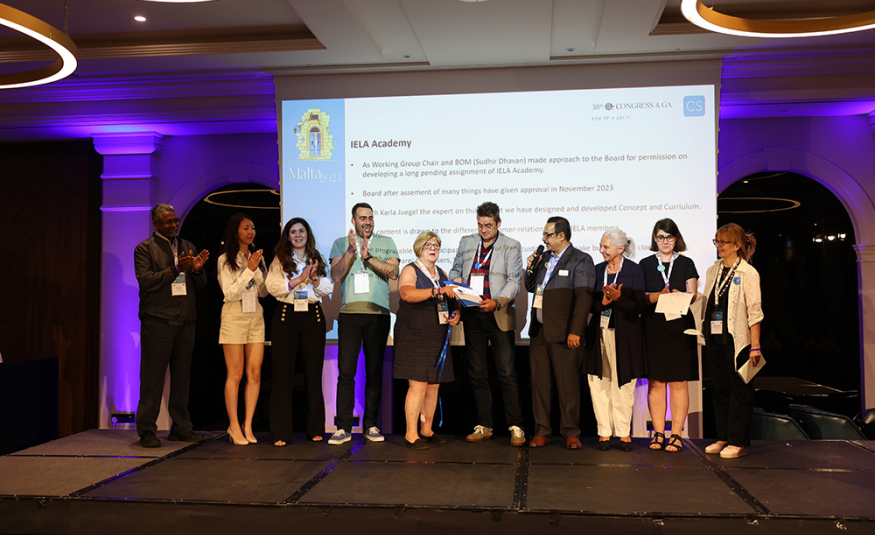Sudhir Dhavan (pictured below), IELA Board member, former chairperson of the IELA Training and Education Programme Working Group and CEO R.E. Rogers India Pte. Ltd., India, discusses the transformative power of industry education and training in shaping the future of talent.
 In today’s rapidly evolving business landscape, workforce scarcity and talent gaps are significant challenges, hence the role of education and training within industries has become increasingly vital.
In today’s rapidly evolving business landscape, workforce scarcity and talent gaps are significant challenges, hence the role of education and training within industries has become increasingly vital.
This article explores the game-changing potential of investing in professional development and training as a means to not only enhance performance and quality but also attract new talent, rehire former employees, and foster integration within organisations and industries.
By examining the positive impact of industry-focused education and training, we can uncover innovative strategies for building the future of talent.
The International Exhibition Logistics Association (IELA) Academy and programme has been initiated to strengthen the knowhow of existing employees as well as strengthen the success of the company within the competitive environment.
The role and responsibility of specific industry associations as industry representatives is to care for well-educated personnel to strengthen the success of the complete industry as well as the individual member companies.
Workforce scarcity
There are several factors to consider when addressing the question of personnel and talent to build current and future teams in our organisations. There are staffing scarcities on the job market and this influences the manner in which the recruitment process changes and adapts.
Current challenges and trends in the job market created by the talent shortage include redefining job descriptions, experience requirements and qualifications, and investing more in education and training. The importance of developing a skilled workforce to overcome scarcity becomes a leading priority in order to satisfy current and future market needs on a global scale.
As a global industry association, IELA has identified this need and is providing industry-specific education and training programmes to its members as solutions: IELA’s Operations Summit biennial event is the only dedicated forum for exhibition and event freight forwarding operation professionals, offering valuable perspectives on improving operational efficiencies, enhancing service standards, optimising worldwide relationships and increasing bottom lines. In addition to this, IELA organises its Winter Seminar for young professionals as a biennial members-only education and networking event giving industry newcomers the opportunity to join an exclusive programme dedicated to the complex and specialised issues and procedures in their industry.
On a long-term strategy basis, IELA has understood and fully supports the goal of enhancing Performance and Quality. Evidence shows clearly that there is a strong correlation between education and training and improved performance. Specialised training is imperative in enhancing industry-specific skills among new recruits in our industry sector which is itself changing rapidly in many respects involving the quality, know-how and technical requirements.
Training is an on-going matter and IELA recognises the positive impact of continuous professional development on quality standards which is very much at the heart of the association. Many case studies and success stories highlighting performance improvements are to be found among its members worldwide.
‘There is a strong correlation between education and training and improved performance’
How to attract new talent
When talking about job opportunities and new staff, the question of how to attract new talent has become very important. IELA has leveraged education and training programmes as a recruitment tool. Employees value having opportunities for growth and development in the workplace. Employers welcome this type of employee as the individuals dedicated to personal growth show considerable initiative and ambition which has positive repercussion on an organisation’s business.
By promoting industry-specific education, the pathway is clear to career advancement and gives the candidate a future perspective. Collaboration between educational institutions and industries enhances this to attract new talent. Previous IELA students give testimonials on the quality of the ‘hands-on’ training given, what they have learnt and how educational opportunities attracted them to the industry.
A developing trend in recent years is that former employees return to an organisation. Employers recognise the value of this and adapt their strategy in order to accommodate for the differing needs presented by the ‘new’ personnel. The main challenges here are in reintegrating former employees and creating training programmes for them on returning to the organisation. Regarding this point, IELA members can exchange case studies on successful reintegration and recruitment initiatives within the association in order to promote best practices on a global basis.
Despite its successful association efforts to go forward in confronting these current challenges, IELA recognises the need to foster integration within the individual organisation and within the industry. The performance of an organisation is heightened through increased educational and training implementation as employees achieve their tasks more effectively and efficiently. Moreover, training influences employee performance which builds a strong organisational culture.
Learning cultures impact all areas of your business, from productivity to retention. By creating a learning environment in an organisation, collaboration and innovation are encouraged which are of pure benefit to a business. IELA promotes such a culture and plays a major role in developing awareness within the organisational culture of its member organisations.
Due to the challenges which have developed in the industry, time and efficiency are of the essence to fulfil customer requirements. IELA is investing seriously and on a regular basis to provide full training sessions and information material in order to support its members in achieving their goals.
Not only short-term, but primarily long-term strategies are considered when discussing industry challenges. And here the industry as a whole is being addressed. IELA has many projects within the industry with various leading organisations and associations in order to ensure that the sector takes action to build the pathway ahead.
Industry-wide initiatives for knowledge-sharing and skill development have been agreed and are in the planning. The advantages of fostering integration within the industry are very clear when it comes to identifying the long-term benefits to secure future opportunities.
Conclusion
In an era of workforce scarcity, industry-focused education and training have emerged as game-changers in shaping the future of talent. By investing in professional development and training, organisations not only enhance performance and quality but also attract new talent and rehire former employees, thereby fostering integration within their industry.
By recognising the transformative power of education and training, industries can build a highly skilled workforce capable of navigating the challenges of tomorrow and driving innovation. Embracing this approach will undoubtedly position organisations and industries at the forefront of success in the ever-evolving global marketplace.





